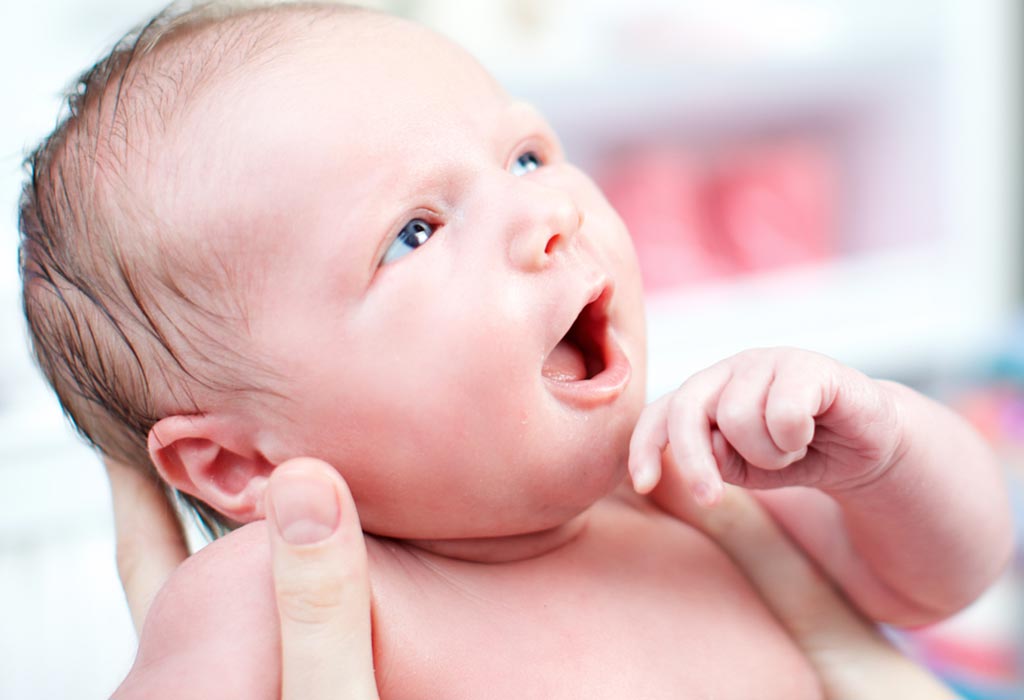In this Article
Newborns don’t talk but they have a language of their own, which they use to communicate with their parents. But sometimes they make certain strange noises which can be a cause of worry for their parents. If you have a newborn in your house, the occasional grunts coming from him might make you think that he is in pain and obviously you will worry. If your newborn grunts, you should consult a doctor immediately.
Why Do Newborns Grunt?
Usually, newborns grunt grunt when they have issues related to respiration. Sometimes, a baby may make strange noise if he has digestion problems, but that noise should not be confused with grunting. Grunting is related to respiratory issues, and if your baby grunts, you must take your baby to the doctor at the earliest.

Is it Normal for a Newborn to Grunt?
Usually, a baby grunts because his organs are still developing. What really happens is that as he uses the diaphragm muscles to move the bowel, it puts pressure on the voice box or larynx, which results in grunting. The grunting that happens because of this process is pathological (it could be because of some physical or mental injury). By this, a newborn tries to prevent the collapse of the alveoli. A baby may even produce noises if he has gas troubles, but it is not same as grunting.
Causes of Grunting in Infants
Babies make different noises for different things. Although babies usually grunt if they have a problem in their respiratory system, sometimes, they may even grunt because of other problems. Read on to know the causes of grunting in babies.
- Respiratory Problems: Neonatal respiratory distress is a condition that occurs when a baby’s respiratory organs are not matured completely. This is more likely to happen in premature babies, but it can even happen to babies who have had normal birth as well. If a baby has respiratory issues, along with grunting, you will notice some other signs too such as unusual breathing movements, skin turning blue, nasal flaring. These signs are usually a response to hypothermia.
- Delay in the Development of Organs: Sometimes, premature babies may have organs that are not matured or must be still developing, hence they may grunt.
- Sepsis: Sepsis is a serious condition where a baby is affected by an infection that runs in the blood. This condition is accompanied by other signs like loud grunting, which happens because of breathing difficulty.
When to Consult a Doctor
If your baby grunts because of some serious health issues like a respiratory problem, you must consult a doctor. If you notice the following signs in your baby, take him to a doctor immediately:
- Difficulty in Breathing: Grunting in infants can be a sign of medical condition if the baby grunts too often. If you notice that your baby is experiencing difficulty in breathing, then you should consult a doctor as it could be a sign of a respiratory condition.
- Skin Turning Blue: If your baby’s breathing pattern disrupts unusually, you will notice his skin turning blue. You should take him to a doctor in this case.
- Signs of Illness: When a baby has some health problem, he might make different noises and may also grunt. When grunting is accompanied by other issues like fever, shortness of breath, indigestion, then you need to take him to a doctor.
Are There Any Home Remedies for Grunting?
No, there are no home remedies for grunting and you shouldn’t try anything on your own to stop your baby from grunting. Most often, babies grunt because of pathological issues (physical or mental issues), so you should take him to a doctor and get him treated.
As a parent, no doubt, you will worry if your baby grunts more than often. But you need not panic, consult a doctor and get this condition treated. Also, if you notice other signs mentioned above along with grunting in your baby, seek medical care urgently.









